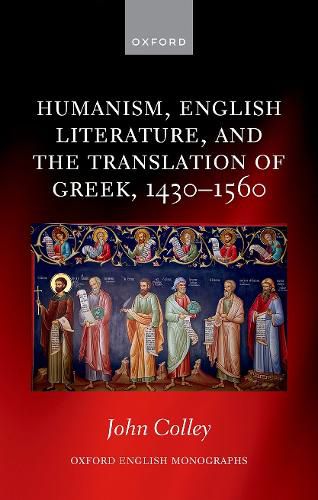Readings Newsletter
Become a Readings Member to make your shopping experience even easier.
Sign in or sign up for free!
You’re not far away from qualifying for FREE standard shipping within Australia
You’ve qualified for FREE standard shipping within Australia
The cart is loading…






Humanism, English Literature, and the Translation of Greek, 1430DS1560 is the first study to trace the influence of the Quattrocento rebirth of Greek scholarship on fifteenth- and sixteenth-century English literature. It begins with the first signs of humanist Greek in England in and around Duke Humfrey's circle, at a time when no English writer could claim significant Greek literacy. It ends on the cusp of Elizabethan literary culture, when English writers much more frequently translated Ancient Greek into both Latin and the vernacular. This period witnessed a surge in the translation of Greek. It also witnessed changing beliefs about how and why Greek should be translated at all, especially under the growing pressures of the Reformation.Building on scholarship in the fields of classical reception, translation studies, and intellectual history, the volume argues that attending to the period's ideas about Greek translation fundamentally alters our perception of Tudor humanism and the classical tradition more widely. In linking biblical and patristic translation with the translation of works by pagan authors, the book shows that Renaissance humanism was less secular and more wide-ranging in its goals and interest than the standard scholarly narrative has claimed. By showing continuities between late medieval and early modern literature, it further revises arguments for the novelty of the sixteenth-century humanists. The book ultimately argues that fifteenth- and sixteenth-century English writers experienced a contradictory relationship to Greek. Desire for the language and what it stood for was tempered by the realities of its mediated transmission. Desire for Greek was also undercut by the sectarian divisions that the language came to reflect and magnify.
$9.00 standard shipping within Australia
FREE standard shipping within Australia for orders over $100.00
Express & International shipping calculated at checkout
Humanism, English Literature, and the Translation of Greek, 1430DS1560 is the first study to trace the influence of the Quattrocento rebirth of Greek scholarship on fifteenth- and sixteenth-century English literature. It begins with the first signs of humanist Greek in England in and around Duke Humfrey's circle, at a time when no English writer could claim significant Greek literacy. It ends on the cusp of Elizabethan literary culture, when English writers much more frequently translated Ancient Greek into both Latin and the vernacular. This period witnessed a surge in the translation of Greek. It also witnessed changing beliefs about how and why Greek should be translated at all, especially under the growing pressures of the Reformation.Building on scholarship in the fields of classical reception, translation studies, and intellectual history, the volume argues that attending to the period's ideas about Greek translation fundamentally alters our perception of Tudor humanism and the classical tradition more widely. In linking biblical and patristic translation with the translation of works by pagan authors, the book shows that Renaissance humanism was less secular and more wide-ranging in its goals and interest than the standard scholarly narrative has claimed. By showing continuities between late medieval and early modern literature, it further revises arguments for the novelty of the sixteenth-century humanists. The book ultimately argues that fifteenth- and sixteenth-century English writers experienced a contradictory relationship to Greek. Desire for the language and what it stood for was tempered by the realities of its mediated transmission. Desire for Greek was also undercut by the sectarian divisions that the language came to reflect and magnify.